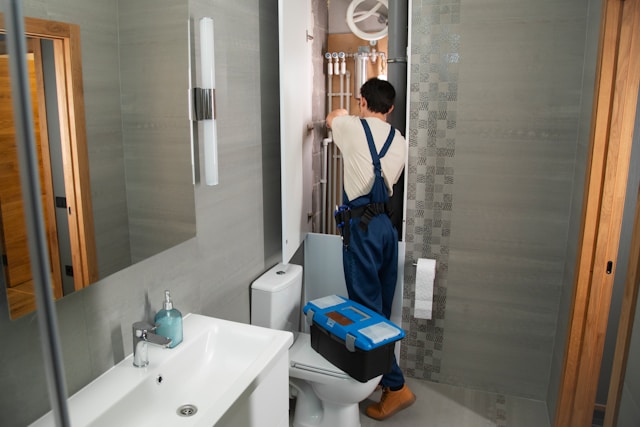I thought renting out my flat in London would be easy money.
It wasn’t.
Between the surprise boiler breakdown, a tenant who ghosted halfway through the lease, and the relentless legal obligations that somehow no one talks about, I got a crash course in what it really means to be a landlord in the capital.
Turns out, I’m not alone. Nearly half of UK landlords have considered leaving the rental market altogether due to rising costs, legal complexity and tenant challenges. But if you’re thinking of renting out your flat, don’t panic. Here’s what I wish I’d known before I handed over the keys and how you can avoid the same mistakes.
Setting Up Took More Time Than I Expected
Before I could even list the flat, there was a long to-do list, I didn’t see coming. Gas safety certificate, electrical installation condition report, smoke and carbon monoxide alarms, Energy Performance Certificate (EPC) are just some of the things I had to get in place.
Oh, and I had to update the fire door hinges.
What I assumed would be a quick spruce-up turned into two weeks of contractor visits, emails and box-ticking. In the UK, landlords are legally required to comply with multiple regulations to rent out a property safely and legally.
Lesson one? Renting out a flat isn’t about income first, it’s about compliance first.
I Didn’t Budget for Repairs. Big Mistake.
One month in, the boiler packed up.
Two weeks later, the shower drain backed up and damaged the hallway carpet. £200 for the plumber, £100 for a dehumidifier and let’s not talk about the mould.
These weren’t luxury renovations, they were “can’t-wait-until-payday” emergencies. And because I hadn’t set aside a maintenance buffer, the costs hit hard.
If you’re planning to rent out your flat, budget at least 10 – 15% of the monthly rent for repairs. Even if nothing breaks immediately, it’s best to be prepared for these emergencies.

Photo by bhagya laxmi on Unsplash
Finding a Tenant Wasn’t the Hard Part. Managing One Was.
With the flat in a good location, it took barely a week to find a tenant. That was the easy part.
I, now, know that referencing is more than just checking if they have a job. I missed a few red flags: inconsistent references, a rushed move-in, and the fact that they insisted on cash payments “until their bank sorted a new card”.
A few months in, the neighbour messaged me about loud music. Then came the skipped rent. Then the texts stopped altogether. It became emotionally exhausting wondering each month whether the rent would appear or whether I’d need to chase it again.
Lesson? Be firm with your tenancy agreement, use a proper agent for checks if you’re unsure.
Void Periods Hurt More Than I Thought
After that first tenancy ended, it took nearly two months to get someone else in.
That’s two months with no rent—but still with council tax, service charges, and mortgage repayments ticking away like normal. I assumed I’d always have someone lined up. I was wrong.
I eventually spoke to someone at a local property service who explained how guaranteed rent models actually work. It made me realise I didn’t have to juggle everything myself and these services handle repairs, paperwork, and even offer rent during voids.
For anyone in the same boat, here’s the one I looked into: www.cityboroughhousing.co.uk
If I’d known about that earlier, I could’ve saved myself a couple of grey hairs.
The Legal Maze Can Trip You Up
I used a tenancy agreement template I found online. It looked official enough. But when I needed to serve notice, I realised it didn’t actually align with Section 21 guidelines and I nearly invalidated the entire thing.
Then there was the deposit. I kept it ready but forgot to send the prescribed information to the tenant within 30 days. Another legal misstep. Technically, they could have taken me to court for that.
Even now, the laws are changing fast. If you’re not reading updates from somewhere like Shelter or GOV.UK, you’re already behind. For example, new rules around no-fault evictions and tenancy types are coming under the Renters’ Reform Bill, and many landlords still aren’t aware of what it will mean for renewals, rent increases, or end-of-tenancy processes.

Photo by MART PRODUCTION on Pexels
What I’d Do Differently Next Time
If I had to do it all over again, I’d:
- Set up a landlord fund: Just in case anything breaks. £1,000 minimum.
- Get landlord insurance: Standard home insurance won’t cut it once you have tenants.
- Use a local letting agent or guaranteed rent provider: Especially if you’ve got a full-time job. Managing it solo was stressful
- Read up on legal changes: The NRLA and Shelter offer solid updates and guidance
And above all? I’d treat renting like a business not a side hustle.
Renting a Flat Isn’t a Shortcut to Easy Money
Letting out my London flat taught me a lot: about buildings, about people, about patience and about myself. It’s not a passive income stream. It’s a hands-on project with legal, emotional and financial stakes.
But it can work, if you prepare properly, stay realistic and get help when you need it. You can turn your property into something that works for you, not against you.
Whether you’re a seasoned landlord, a flatmate survivor, or just figuring it all out – London Stories wants to hear from you. Share your story with us and help someone else avoid the same mistakes.

